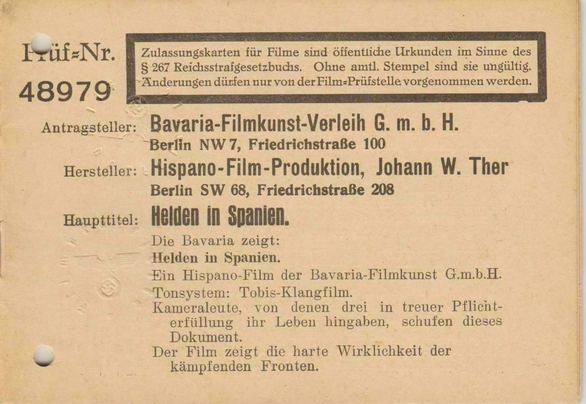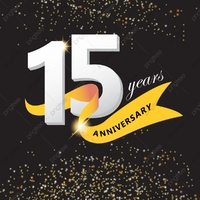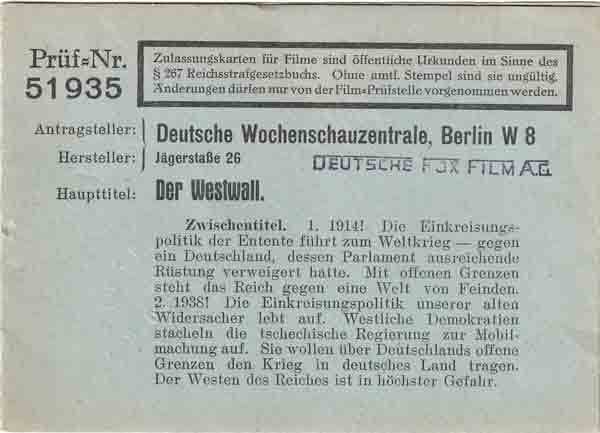Film Censorship Cards –Filmprüfstelle
The German Film Censorship Board was established by legislation in 1920 in the Weimar Republic, was renamed the Reichsfilmprüfstelle in the Third Reich, and its post–war equivalent, the FSK, operates in Germany to review, approve, classify and manage the screenings of films to the general public.
Film censorship cards have a number, such as Prüf–Nr. 51935 as shown on the card for the 1939 documentary film Der Westwall, illustrated here. The cards provide an exact written text of the film’s scenes and all words spoken as narration or dialogue throughout the length of the film. Feature film’s cards also indicate the production head, scriptwriter, camera, sound and scenic artists, music composer, etc. The final page of a card indicates the film’s running length in meters.
Many early silent and some sound films on nitrate were lost and no prints exist today, so their censorship cards can provide a way to confirm their contents. Some early films that were issued in different international versions, in need of restoration or reconstruction from various combined prints, rely on their censorship card for exact reference points in this work. Fritz Lang’s Metropolis was a recent case.
The cards number each film’s scene, and each line of dialogue – word for word – is broken down into numbered sentences. A feature film’s card is actually fifty or more pages long of densely printed text. The cards provide an exact record of the final edited version of a film as released with the government’s approval for public screening.
Due to the immediate post-war chaos, destruction, looting and taking of war “booty” by the Allies and Red Army, there exists in Germany today no central repository for Germany’s film cards. The Bundesarchiv has many, but certainly many hundreds of German film titles are not represented there. More cards are held in various scattered film museum collections in cities such as Frankfurt, Berlin, and Munich; or in other public and private archives, and undoubtedly some are still in Moscow. Occasionally original cards are available to purchase from Antiquariat bookstores or the internet.
German Films Dot Net has in its Collection the following original censorship cards:
Deutsche Wochenschauzentrale, Berlin
Der Westwall (1939)
Deutsche Wochenschau Nr. 572, Nr. 627, Nr. 629
Reichsliga–Film GmbH München
Im Photoatelier (1932, Kurzfilm – Karl Valentin, Regie: Karl Ritter)
Universum–Film Aktiengesellschaft
Weltfeind Nummer Eins. (Sept. 1936) note: this is a 313 metre long film – about 12 minutes running time – on the threat of Bolshevism promoted by Moscow around the world and Germany's strong defense against it. The film was awarded the predicats "politically worthy" and "Volks educational," and designated a school training film, on 10 Sept. 1936. The Bundesarchiv has confirmed that no print of this film exists in their collection.
Ufaton–Woche, Universum–Film Aktiengesellschaft, Berlin
Ufaton–Woche Nr. 477, Nr. 478 (1939)
Fox Tönende Wochenschau, Berlin
XIII: Nr. 33 – 43, Nr . 45–52 (1939)
XIV: Nr. 1 – 26. (for Nr. 25’s poster click here.)
Reichsbahn–Filmstelle, Berlin
Dunkle Tannen – tiefe Täter (1935)
Hammer–Tonfilm/San Ei Sah Produktion, Tokio
Sommer in Japan (1935)
Aco–Film, Berlin
Gepäckschein 712 (1937)
Ufa/Tobis/Terra/Bavaria/Froelich/Tonlicht/Paramount feature films
Achtung! Feind hørt mit! (1940)
Berge in Flammen (1931)
Bismarck (1940)
Carl Peters (1941, also the 1944 re–release card)
Friesennot (1935) – re–released as Dorf im Roten Sturm in 1941.
Die goldene Stadt (1942) 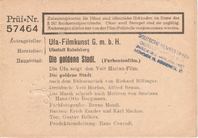
Der Herrscher (1937)
Himmelhunde (HJ film)
Ich für Dich – Du für mich (1934)
Ich klage an (1941)
Kopf Hoch, Johannes! (1941)
Leinen aus Irland (1939)
Die Rothschilds (1940)
S A Mann Brand (1933) + Prädikat card ("volksbindend" and "künsterlich" ). These two cards from the Munich Film Censorship Office.
Standschütze Bruggler (1936)
Weiße Sklaven (1936)
Der zerbrochene Krug (1937)
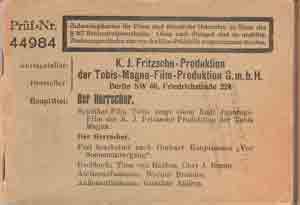
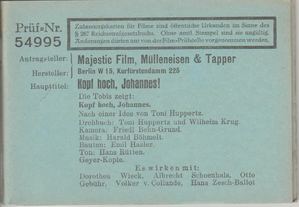
We also have the October 21, 1932 Film Censorship card for the short film produced by the NSDAP, Abteilung Film, called Das junge Deutschland marschiert. This film (737 meters) was banned by the Weimar government for any screenings in Bavaria.
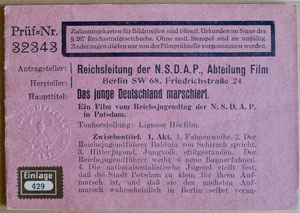
We also have the Bavaria Aktiengesellschaft censorship card for the Hispano Film – Bavaria Film on the Spanish Civil War, Helden in Spanien which we discuss in our new book on Legion Condor – Karl Ritter's lost 1939 feature film. This is an exceedingly rare film treasure!
